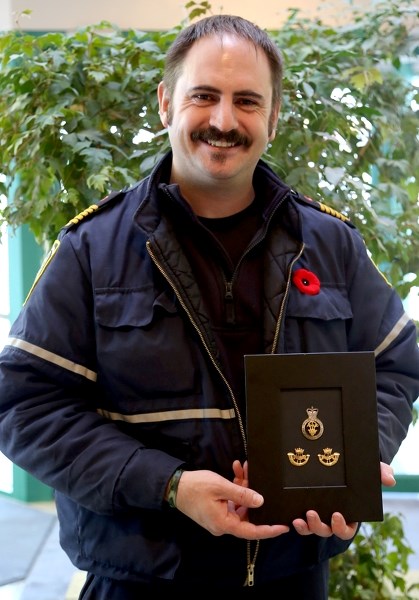When we think of veterans at Remembrance Day, the images that often comes to mind are of older women and men whose time in the military came before the end of the Korean War in 1953.
However, there have been many other military exercises Canada has been involved in since then, each one producing a new crop of veterans.
Here in Westlock, we have a number of such veterans, whose experiences are more recent, and who do not fit the stereotype of a former member of the Canadian Forces. One is town fire chief Stuart Koflick, who draws his military experience from the six years he served with the Princess Patricia’s Canadian Light Infantry in the early-to mid-1990s, including a tour of duty in the Balkans.
Koflick said he first joined the military in 1991, somewhat as a fulfillment of a childhood desire.
“It seems like a cliché,” he said. “I always wanted to serve the public, to serve the community, to serve my country in some way, shape or form in uniform.”
He started down the road to a military career as a cadet in the 1980s, and supplemented that with a stint as a junior firefighter. Koflick served in the reserves with the South Alberta Light Horse in Edmonton before enlisting fulltime with the ambition of becoming either a military firefighter, a military police officer or a pilot.
Unfortunately, certain circumstances conspired to derail a few of those dreams.
He didn’t want to return to school to get the education required to become a pilot, and he learned it was not possible to enlist directly into the fire department or the police ranks.
Instead, Koflick ended up in the combat arms infantry. It was a result he enjoyed, and one that showed him that perhaps he would not have liked being a military police officer.
“I learned not to like the military policemen,” he said. “It’s just like any young recruit, you get exposed to the dos and don’ts and sometimes you get into a little bit of trouble and all that good stuff.”
By the time Koflick left the military in 1997, he had had the chance to serve overseas for six months in a peacekeeping role. It was an experience he continues to carry with him.
“I certainly have a different opinion of peacekeeping operations,” he said. “Peacekeeping operations that were going through the 90s certainly weren’t the peacekeeping operations that Lester B. Pearson thought of. I don’t think you can consider a peacekeeping operation peacekeeping when there’s no peace to keep.”
It’s hard for Koflick to speak in detail about his time in the Balkans, even 15 years after he left the military.
“There were a lot of things that happened and there were a lot of things that we felt helpless against,” he said.
One thing that still sticks with him is seeing the destruction all over the place. It’s one thing to be involved in an armed conflict between two armies, he said, but it’s another matter entirely when only one side is the aggressor.
“An annihilation of a religion or a race or of a people — ethnic cleansing — that’s something that is a horrible thing,” he said. “Just looking at the devastation that can be wrought upon human beings is very difficult to accept and it’s very difficult to deal with.”
It was a jarring experience knowing what landscape was like before the chaos started.
“You’re going to a country that was once beautiful, was once thriving with beautiful buildings, a beautiful landscape,” Koflick said. “But now it’s turned to piles of rubble, buildings with bullet holes, buildings that are reduced to nothing, people’s homes. People homeless, pushing carts down the street and going places where they don’t even know where they’re going because they have no place to go.”
Having seen all that he saw, he said it was hard to talk to people once he got home about the experience because they weren’t able to fully appreciate what it was like.
“The people, your family, your friends back home that don’t have exposure, that don’t know what it’s all about, can’t relate,” he said. “So when you try and talk to them, they have no clue and it’s very difficult to explain it to them.”
What makes that disconnect with loved ones that much more of a challenge is that once out of the military, it’s hard to keep connected to your military peers, he said. That means for the most part the only ones you can talk to are those who don’t have the same background.
“It was very tough for me to talk about experiences to people that have, and I’m not trying to be sarcastic, but just don’t have a clue as to what happens or what happened,” Koflick said.
For how much his experience in the Balkans affected him, Koflick said he could only imagine how his peers who had families of their own were affected.
He was a young, single man in his 20s at the time, and has no regrets about serving. But he said things would likely have been quite different had his life been different.
“If I had a family, if I was a father, if I had children, if I was married at that time, and I knew then what I know now, it would be a very difficult decision,” he said. “I could do the job single. I don’t know if I could do the job with a family.”
Even with his hesitations about going through the experience had he had a family, Koflick said there is no doubt in his mind he did the right thing.
“I was proud,” he said. “I was proud to serve, I was proud to help people, I was proud to do what I needed to do to serve my country and serve the world on the international stage.”



